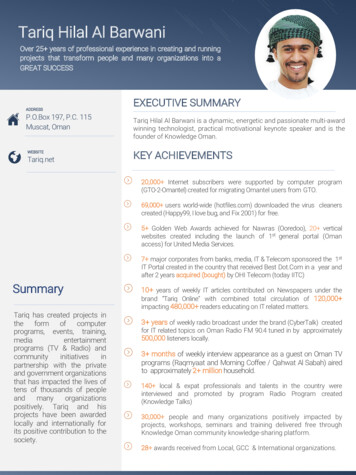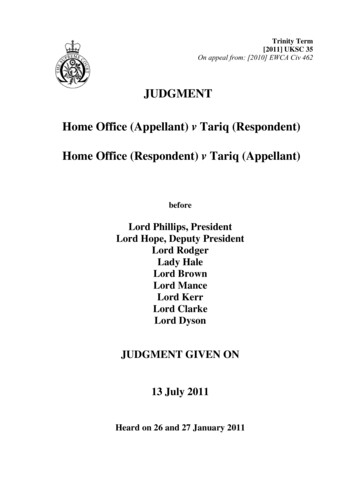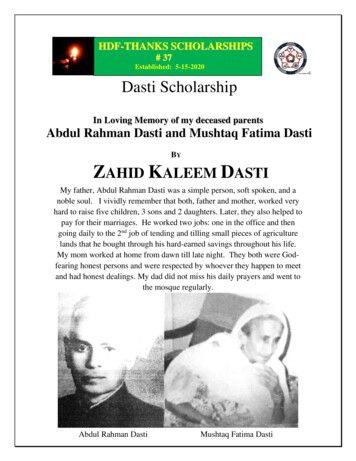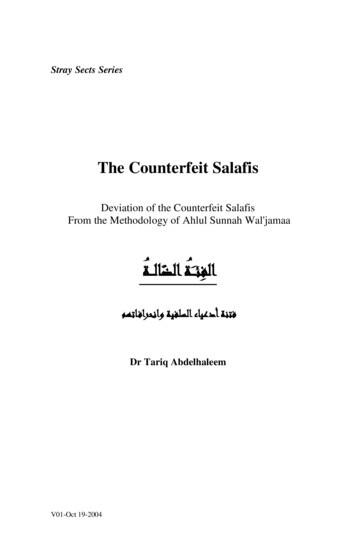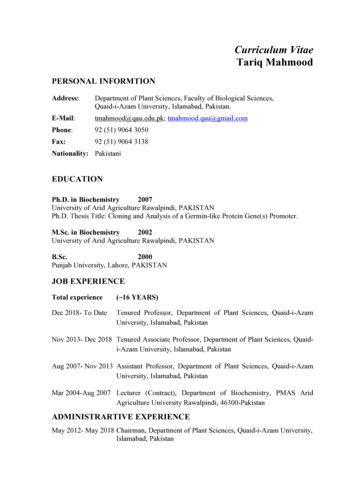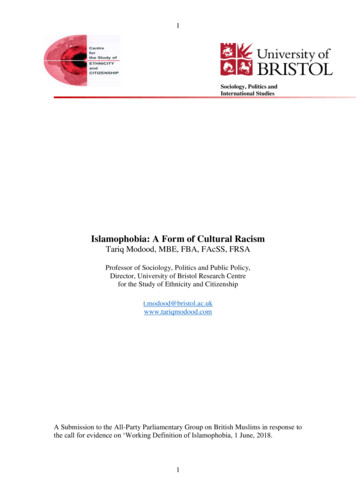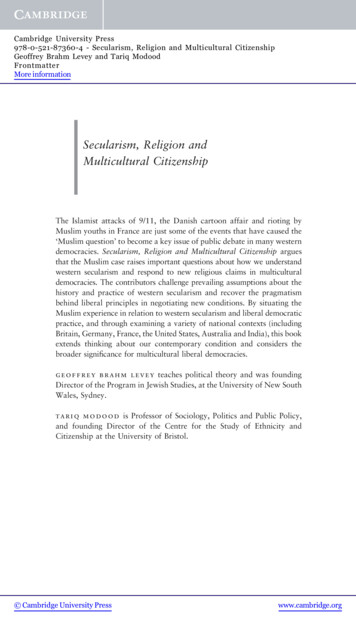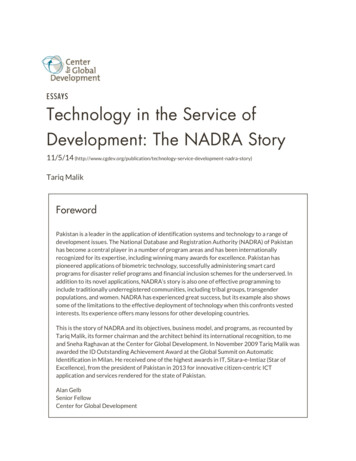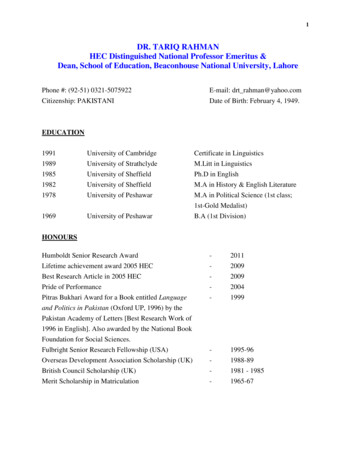
Transcription
1DR. TARIQ RAHMANHEC Distinguished National Professor Emeritus &Dean, School of Education, Beaconhouse National University, LahorePhone #: (92-51) 0321-5075922E-mail: drt rahman@yahoo.comCitizenship: PAKISTANIDate of Birth: February 4, 1949.EDUCATION1991University of CambridgeCertificate in Linguistics1989198519821978University of StrathclydeUniversity of SheffieldUniversity of SheffieldUniversity of Peshawar1969University of PeshawarM.Litt in LinguisticsPh.D in EnglishM.A in History & English LiteratureM.A in Political Science (1st class;1st-Gold Medalist)B.A (1st Division)HONOURSHumboldt Senior Research AwardLifetime achievement award 2005 HECBest Research Article in 2005 HECPride of PerformancePitras Bukhari Award for a Book entitled Languageand Politics in Pakistan (Oxford UP, 1996) by thePakistan Academy of Letters [Best Research Work of1996 in English]. Also awarded by the National BookFoundation for Social Sciences.Fulbright Senior Research Fellowship (USA)-20112009200920041999-1995-96Overseas Development Association Scholarship (UK)British Council Scholarship (UK)Merit Scholarship in Matriculation-1988-891981 - 19851965-67
2EXPERIENCE2011 SeptemberDean, School of Education, Beaconhouse National University, Lahore2010 Jun-JulDAAD Visiting Research Fellow, University of Heidelberg, Germany.2010 AprilProfessor Emeritus, National Institute of Pakistan Studies, Quaid-i-AzamUniversity, Islamabad, Pakistan.2010 Jan-MarVisiting Fellow, Oxford Centre for Islamic Studies, University of Oxford,UK.2007 JulyTenured Professor.2007 June–May 2011 Director, National Institute of Pakistan Studies, Quaid-i-Azam University2004 Sept-June 2005 Quaid-i-Azam Scholar on Pakistan Studies, University of California,Berkeley2004 JanDistinguished National Professor for life2003 JanQuaid-i-Azam Professor, Chair on Quaid-i-Azam and Freedom Movement(NIPS), Quaid-i-Azam University Islamabad.2002 Feb-MarVisiting Professor at the Center of International Studies, University ofCastellon, Spain.2000-2000 Sept-Oct Professor of Linguistics and South Asian Studies, NIPS, QAU AmericanInstitute of Pakistan Studies Lecturer at UT Austin, University ofPennsylvania, Michigan at Ann Arbor and MIT.1999 Sept-OctGuest Professor at the University of Aarhus, Denmark.1990-2000Associate Professor of Pakistani linguistics, NIPS, QAU.1996-1999Research Adviser, Sustainable Development Policy Institute, Islamabad1992Professor of Linguistics, University of Sana'a (Yemen).1987-1990Professor of English and Linguistics and Chairman of the Department,University of Azad Jammu & Kashmir, Muzaffarabad.1985-1987Associate Professor of English literature, University of Peshawar.1982 onwardsGiven talks, interviews, lectures, seminars on Radio, T.V and other fora.1981-1985British Council Research Scholar, University of Sheffield, U.K.1979 onwardsContributing columns, articles, book reviews and short stories to Englishnewspapers.1978-1981University Grants Commission Research Fellow, University of Karachi,Dept. of English.1970-1978Cadet and Officer in the Armoured Corps & Education Corps of thePakistan Army. (appointed adjutant, squadron commander etc)
3HONORARY POSITIONS2001Member, Council of Social Sciences, Pakistan.1996-1999Visiting Fellow and Honorary Chief Editor, Sustainable DevelopmentPolicy Institute, Islamabad.1996-Member Editorial Board for Pakistan, Yearbook in Linguistics, Universityof Montreal, Canada.1994-1997Member Federal Board of Film Censors, Islamabad.1994-Member, English-Speaking Union, Pakistan.
4PUBLICATIONS18 Books, 44 contributions to books/ reference books, 96 articles and 17 book reviews inscholarly journals on literature language, history, politics and education. [See Appendix A fordetails]. Weekly newspaper columns, book reviews in newspapers, reports, occasional papersfrom organizations etc have been listed in complete CV (www.tariqrahman.net).
APPENDIX - A5LIST OF RELEVANT PUBLICATIONS1.BOOKS AND MONOGRAPHS (Total 16)Books based on original research (total 8) are in bold letters. Chapters from thesebooks (28) were often published as papers in journals and sometimes ascontributions to edited books.(1).1979. Poems of Adolescence Rawalpindi: Cezan Books.(2).1989. The Legacy and Other Short Stories New Delhi: Commonwealth Publishers.(3).1990. Pakistani English: The Linguistic Description of a Non-Native Variety ofEnglishIslamabad: National Institute of Pakistan Studies, Quaid-i-AzamUniversity. 2nd Edition, 2010.(4).1991. A History of Pakistani Literature in English Lahore: Vanguard Books (Pvt)Ltd.(5).1991. Work and Other Stories Lahore: Sang-e-Meel.(6).1996. Language and Politics in Pakistan Karachi: Oxford University Press.Paperback reprinted, 1998, 2000, 2003 & 2006. Indian edition by OrientLongman, Delhi, 2007. Latest Edition for Pakistan, Lahore: Sang-e-Meel, 2011.(7).1999. The Third Leg and Other Short Stories Lahore: Sang-e-Meel.(8).1999. Language, Education and Culture Karachi: Oxford University Press.Paperback reprinted, 2000 & 2003. Reprinted as Language, Education andCulture in Pakistan Islamabad: Chair on Quaid-i-Azam and Freedom Movement,NIPS, 2011.(9).2000. Unpleasant Essays: Education and Politics in Pakistan Lahore: Vanguard.(10).2002. Language, Ideology and Power: Language-Learning Among the Muslims ofPakistan and North India Karachi: Oxford University Press. Revised editionpublished by Orient Longman, Delhi, 16 Jan 2008.(11).2002. Selected Short Stories Islamabad: Al-Hamra Publishers.(12).2004. Denizens of Alien Worlds: A Study of Education, Inequality and Polarization inPakistan (Karachi: Oxford University Press, 2004 Reprinted 2006), pp. 210(13).2004. Poems of Autumn Islamabad: Leo Books.
6(14).2010. Language Policy, Identity and Religion: Aspects of the Civilization of theMuslims of Pakistan and North India Islamabad: Chair on Quaid-i-Azam andFreedom Movement, National Institute of Pakistan Studies, Quaid-i-AzamUniversity. 1st ed. January, 2nd ed. June 2010.(15)2010 Linguistics for Beginners: Basic Concepts Karachi: Oxford University Press.(Indian Edition An Introduction to General Linguistics Delhi: Orient Blackswan, 2010.Based on a smaller version of 1997 published by Vanguard Press).(16)2011 From Hindi to Urdu: A Social and Political History Delhi: Orient Blackswan(for sale only in India). World edition Karachi: Oxford University Press.
72.EDITED AND COMPILED BOOKS(1).1995. (ed). Pakistani Sufi Poets Islamabad: Academy of Letters. [edited & introduced](2).2004. Language and Education: Selected Documents 1870-2003 Islamabad: Chair onQuaid-i-Azam and Freedom Movement, Quaie-i-Azam University3.CONTRIBUTIONS TO BOOKS (Total 44)Encyclopedia/ reference books entries are given in bold. Contributions alsopublished as journal articles have been indicated.(1).1988. Teaching Literature: Prose', Teaching of English (Islamabad: Allama Iqbal OpenUniversity, pp.166-181. [This is a Unit of Distance Teaching for the B. Ed Course of theOpen University].(2) The Appreciation of English Poetry', ibid, 183- 210. [As above it is a part of thecourse for teachers who want to teach poetry].(3) Punctuation, Comprehension and Precis-writing'.(4).1991. Higher Education for the Future', Pakistan 2000 A.D .ed R. M Hussain(Islamabad: Pakistan Futuristics Institute), 205-214.(5) English Bibliography 1993', in Kitabiat Pakistani Adab 1993 [Urdu/English:Bibliography: Pakistani Literature] (Islamabad: Academy of Letters, 1994), pp. 221-238.(6) Introduction' to The Sufi Poets of Pakistan with brief biographical notes on the poets,Islamabad: The Pakistan Academy of Letters, 1995.(7)The following entries in Encyclopedia of Post-Colonial Literatures in English Vols 1and 2:a.Hanif Kureishi, Vol 1, pp. 788-789.b.Life Writing, Vol 1, pp. 875-877.c.Short Fiction, Vol 2, pp.1474-1476.(8) Language, Ethnicity and Security', Chapter in Rethinking Security, RethinkingDevelopment (ed) Nauman Naqvi Islamabad: Sustainable Development Policy Institute,1996. pp. 188-196. Also in Text in Education and Society (eds) Allisen, Desmond et. al(Singapore: Singapore University Press, 1999, pp. 238-245). [Paper presented at aconference in the National University of Singapore, September, 1996].(9).1997. Introduction' to Daud Kamal : A Selection of Verse Karachi: Oxford UniversityPress.(10)‘West Pakistani Percetions of the Bengali Language Movement’. In Riaz Ahmed Led),Pakistan Scholars on Quaid-i-Azam Mohammad Ali Jinnah (Islamabad: Quaid-i-AzamLhair (NIPSI, 1999), pp. 232-248. [Revised vision in Ahmed Salim ed It is My Mother’s
8Face: Selected Readings on Bengali Language Movement (Lahore: Sangh, 2006), pp.219-236).(11)2000.’Pakistani Universities: Past, Present and Future’. Chapter 11 in Inayatullah, Sohailand Gidley, Jennifer (eds), The University in Transformation: Global Perspectives on theFutures of the University (Westport, Connecticut. London: Bergin & Garvey, 2000), pp125-136.(12)2000. ‘Langues et enseignement’. Chapter 12 in Jaffrelot, Christophe (ed), Le Pakistan(Paris: Librarie Artheme Fayard, 2000), pp. 423-4[Trans. from English by the editor].(13)2001. ‘Language, Knowledge and Inequality’. Chapter 13 in Abbi, Anvita; Gupta R. S;Kidwai, Ayesha (eds), Linguistic Structure and Language Dynamics in South Asia(Delhi: Motilal Banarsidas, 2001), 185-196 [8th Roundtable of South Asian LanguageAnalysis, Jawaharlal Nehru University, New Delhi, 4-6 January 1997].(14)‘Introduction’ to Tales of the Punjab Told by the People (1894). Edited by Flora AnnieSteel. Karachi: Oxford University, 2002, pp. ix-xvii.(15)‘The Language of the Salariat’, Chapter 4 of The Post-Colonial State and SocialTransformation in India and Pakistan. Edited by. S.M Naseem and Khalid Nadvi.Karachi: Oxford University Press, 2002. pp. 97-128.(16)‘English Teaching Institutions in Pakistan’. Chapter 3 of Language Policy Planning andPractice: A South Asian Perspective Ed. Sabiha Mansoor, Shaheen Meraj and AliyaTahir. Karachi: OUP, 2004.(17)‘Education in Pakistan: A Survey’. (ed) Craig Baxter Pakistan on the Brink: Politics,Economics and Society London, Boulder, Toronto and Oxford: Lexington Books, 2004.pp. 171-190.(18)‘Language, Power and Ideology in Pakistan’, Kukreja, Veena and Singh, M.P (eds).Pakistan: Democracy, Development and Security Issues. (New Delhi and London: Sage,2005), pp. 108-122.(19)‘Reasons for rage: reflections on the education system of Pakistan with special referenceto English’ Hathaway, Robert M. (ed), Education Reform in Pakistan: Building for theFuture Washington, DC: Woodrow Wilson International Center for Scholars, 2005. pp.87-106. Revised version as ‘The Politics of Knowledge: Language, Education and thePotential for Violence in Pakistan’ Rahman, Tariq Education Under Globalization: TheCase of Pakistan Islamabad: Actionaid, 2006. pp. 48-64. A smaller version in SaeedShafqat (ed) New Perspectives on Pakistan: Visions for the future (OUP 2007), pp. 122151. Also published as ‘The Educational Caste System: A Survey of Schooling andPolarization in Pakistan’ Chapter 10 in Globalization, Modernization and Education inMuslim Countries (ed) Rukhsana, Zia (New York: Nova Science Publishers, Inc. 2006)pp. 151-163.
9(20)‘The Significance of Oriental Poetry EM Forster’s A Passage to India’ Chapter inDas, GK and Devadawson, Christel R. (eds) Forster’s A Passage to India: AnAnthology of Recent Criticism (Delhi: Penraft International, 2005).(21)‘Islamic/Muslim Languages in South Asia’, Encyclopedia of Language andLinguistics 2nd edition. (ed) Vol 8, Entry 4218, p 409. Keith Brown, Oxford: Elsevier,2006.(22)‘Ahmed Ali (1908-1994), pp. 15-19 and ‘Taufiq Rafat (1927-1998), pp. 281-284Entries in Dictionary of Literary Biography Vol. 323, South Asian Writing in EnglishLondon: Bruccoli Clark Layman Book, Thomson Gale, 2006.(23)‘Language Policy, Multilingualism and Language Vitality in Pakistan’. In Trends inLinguistics: Lesser-Known Languages of South Asia-Status and Policies, Case Studiesand Applications of Information Technology (eds) Saxena, Anju and Borin, Lars (Berlinand New York: Mouton de Gruyter, 2006), pp. 73-104.(24)‘The Role of English in Pakistan with Special Reference to Tolerance and Militancy’. InTsui, Amy B. M. and Tollefson, James W (eds), Language Policy, Culture, and Identityin Asian Contexts (London and New Jersey: Lawrence Erlbaum Associates, Publishers2007), Chapter 12, pp. 219-239.(25)‘Language Policy in Pakistan’ In Encyclopedia of Language and Education secondedition (eds) Stephen May and Nancy H. Hornberger New York: Springer, pp. 383392.(26)‘Madrasas: The Potential for Violence in Pakistan?’ in Jamal Malik (ed) Madrasa inSouth Asia: Teaching Terror? (London: Routledge, 2008), pp. 61-84.(27)‘Abd al-Haqq Baba-yi Urdu’, Encyclopedia of Islam. E.J. Brill. Revised 2009 edition.(28)‘The History of Arabic in South Asia’, Encyclopedia of Arabic Language andLinguistics Gen .ed. KEES VERSTEEGH Vol-III (London: Brill, 2008), pp. 506-512.(29)‘Language Problems and Politics in Pakistan’. In Handbook of South Asian Politics:India Pakistan, Bangladesh, Sri Lanka and Nepal, Edited by Paul Brass (London & NewYork: Routledge Taylor & Francis Group, 2010), pp. 232-246.(30)‘The Education System in Pakistan with Respect to Inequality’ in Shaping a Nation AnExamination of Education in Pakistan eds. Stephen Lyon and Lain Edgar (Karachi:Oxford University Press 2010), 231-261.(31)‘English as Linguistic Capital in a Globalizing World’. In English Language Educationin South Asia (eds) Lesley Farrell, Udaya Narayana Singh and Ram Ashishgiri (Delhi:Cambridge University Press under the imprint of Foundation Books, 2011), pp. 221-232.(32)‘Images of the “Other” in school Textbooks and Islamic Reading Material in Pakistan’ inWorld Yearbook of Edcuation 2011: Curriculum in Today’s World-Configuring
10Knowledge, Identities, Work and Politics (eds) Lyn Yates and Madeleine Grumet(London and New York: Routledge, Taylor & Francis Group, 2011) pp. 177-194.(33)‘Bengali Language’, The Oxford Companion to Pakistani History (ed) Ayesha Jalal(Karachi: Oxford University Press, 2012), pp. 66-67.(34)‘Education in Pakistan’, Ibid, pp.143-144.(35)‘English Language’, Ibid, pp, 154-156.(36)‘Hindi Language’, Ibid, pp. 199.(37)‘Hindko’, Ibid, 199-200.(38)‘Language Issue’, Ibid, pp. 311-313.(39)‘Punjabi Language’, Ibid, pp.437-439.(40)‘Saraiki Language’, Ibid,pp.459.(41)Sindhi Language’, Ibid, pp 484-486.(42)Tariq Rahman, ‘Sindhi Language Bill,’ Ibid, pp. 486-487.(43)‘Urdu Language’, Ibid, pp.522-524.(44)‘Urdu-Hindi Controversy’, Ibid, pp. 526-527.
114.JOURNAL ARTICLES (96)Articles in anonymously refereed journals which are indexed and abstracted are in boldtype. Some articles were first published in Pakistan and abroad as foreign publications arenot available here. These earlier versions are given in the detailed bio-data not here. Theyhave been counted only once. Articles published as chapters of books have been indicatedin brackets.The Higher Education Commission of Pakistan (HEC) has categorized them as W, X, Yand Z. The list below is arranged according to this order.HEC CATEGORY ‘W’(Peer-reviewed, indexed journals with impact factor from industrially advanced countries: USA,UK and Europe with indices given in brackets. The impact factors of previous five yearsaverage are given in square brackets).1.‘Eplebophilia and the Creation of a Spiritual Myth in the Works of Ralph NicholasChubb’, Journal of Homosexuality [New York] Vol-20: Nos. ½ (1990), pp. 103-127[Impact factor 0.752]2. Language and Politics in a Pakistan Province: The Sindhi Language Movement'Asian Survey [University of California, Berkeley] 35: 11 (November 1995), 1005-1016[earlier version published as chapter 7 of Language and Politics in Pakistan, 1996][Impact factor 0.446].3. Language of the Proto-Historic Indus Valley', The Mankind Quarterly [USA] 36:Nos. 3 & 4(Spring/Summer 1996), 221-246. [Impact factor 0.269]4.The Urdu-English Controversy in Pakistan', Modern Asian Studies [Cambridge,UK] 31: 1 (1997), 177-207. [Impact factor 0.438] [earlier version as chapter 13 ofLang and Pol].5.‘Language and Ethnicity in Pakistan’, Asian Survey [USA] Vol. XXXVII, No. 9(September 1997), 833-839. [Impact factor 0.446]6.‘Transforming the Colonial Legacy: the Future of the Pakistani University’,Futures, [U.K] Vol.30:No. 7 (1998), 669-680. [Published by Inayatullah and Gidleyin their edited book given on serial No. 11 above] [Impact factor 1.080]7.‘Language Ideology, Identity and the commodification of Language in the CallCenters of Pakistan’, Language in Society, [Cambridge University Press UK, USA](2009), pp. 233-228. [Impact factor 1.210]Total impact factor of above journal articles: 4.641Total impact factor including book reviews/ review articles: 9.621
12HEC CATEGORY ‘X’(Peer-reviewed, indexed journals from industrially advanced countries: USA, UK, Europe,Australia and Japan with indices given in brackets. Without impact factor)8.1 The Homosexual Aspect of Forster's A Passage to India', Studies in EnglishLiterature [Tokyo] (Mar, 1984), pp.37-54.9.2 Edward Carpenter and D. H. Lawrence', American Notes & Queries [University ofKentucky USA] (Sept-Oct, 1985), pp.18- 20.10.3 E. M. Forster and Ghalib', American Notes & Queries [USA] (Jan- Feb, 1985), pp.80-81.11.4‘Edward Carpenter's From Adam's Peak to Elephanta as a Source of E. M. Forster'sA Passage to India’, Forum for Modern Language Studies [University of St. Andrews,U.K] 22: 1 (Jan, 1986), pp.10-15. [repr. Twentieth-Century Literary Criticism TCLC88 eds. Baise, Jennifer and Ligoti, Thomas. Detroit: Gale Group, 2000, pp. 92-96].12.5‘Edward Carpenter and E. M. Forster’, Durham University Journal [England] (Dec,1986), pp.59-69. [repr. Twentieth-Century Literary Criticism. As above, pp. 96-105].13.6 The Use of the Millenarian Myth in E. M. Forster's Howards End', Studies inEnglish Literature [Tokyo] (Mar, 1987), pp.33-60.14.7 E. M. Forster's Breakaway From the Ephebophilic Literary Tradition', EtudesAnglaises [Paris] 3 (July-Sep, 1987), pp.267-278.15.8 The Literary Treatment of Indian Themes in the Works of Edward Carpenter',Durham University Journal [UK] 53: 1 (Dec, 1987), pp.77-81.16.9 A Study of the Under Plot in E. M. Forster's Where Angels Fear to Tread', Studiesin English Literature [Tokyo] (Mar-Apr, 1988), pp.97-105.17.10 The Significance of Oriental Poetry in E. M. Forster's A Passage to India', DurhamUniversity Journal (Dec, 1988), pp.101-110.18.11 Zulfikar Ghose and the Land of His Birth', Review of Contemporary Fiction[University of New Mexico] 9: 2(Summer, 1989), pp.179-187.19.12 Boy love in the Urdu Ghazal' Annual of Urdu Studies, [Chicago University, USA](1990) pp. 1-20].20.13 A Study of E. M. Forster's Maurice', Durham University Journal [UK] 51: 1 (Jan,1990), pp. 81-87.21.14 Maurice and the Longest Journey', Studies in English Literature [Tokyo] (Mar,1990), pp.57-75.
1322.15 A Short History of the Pakistani Novel in English', Commonwealth Novel in English3: 2 (Fall 1990), 143-159.23.16 ‘Linguistic Deviation as a Stylistic Device in Pakistani English Fiction’, Journal ofCommonwealth Literature (UK), 25: 1 (1990) pp. 1-11.24.17 Politics in the Novels of Salman Rushdie', The Commonwealth Review [New Delhi]1: 2 (1990), pp.102-117. Also in Commonwealth Novel in English 4: 1 (Spring 1991),24-37.25.18 The Under Plot in E. M. Forster's The Longest Journey', Durham UniversityJournal [UK] 52: 1 (Jan, 1991), pp.59-67.26.19 Syed Ross Masood and A Passage to India', American Notes and Queries [Universityof Kentucky, USA] 4: 2 (April, 1991), pp.78-81.27.20 The Double plot in E. M. Forster's A Room With a View', Cahiers Victoriens etEdouardiens [France] 33 (1991), 43- 62.28.21 The Use of Words in Pakistani English', English Today (Cambridge, UK) 7: 2 (Apr1991), pp. 32-38. [based on part of chapter 5 of Pakistani English].29.22 The Phonetic and Phonological Features of Pakistani English', World Englishes(Oxford; U.K), 10: 1 (Spring, 1991), pp. 83-95. [earlier version of chapter 3 ofPakistani English].30.23 Critical Prejudices to Aspects of Partition Literature: Universal VersusEthnocentric Values', The Toronto South Asian Review [Canada] 11: 1 (Summer1992), 69-78.31.24 The Siraiki Language Movement in Pakistan, Language Planning and LanguageProblems 19: 1 (February 1995) [New York & Berlin] [earlier version of chapter 10 ofLanguage and Politics in Pakistan].32.25 The Pashto Language Movement in Pakistan', Contemporary South Asia [UK] 4:2(July 1995), 151-170. [earlier version of chapter 8 of Lang and Pol].33.26 British Language Policies and Imperialism in India', Language Problems andLanguage Planning [UK] 20: 2 (Summer 1996), 91-115. [earlier version of chapter 3of Lang and Pol].34.27 The Balochi/Brahvi Language Movements in Pakistan' Journal of South Asian andMiddle Eastern Studies 19: 3 (Spring 1996), 71-88. [based on chapter 9 of Lang andPol].35.28 The Punjabi Language Movement in Pakistan', The International Journal of theSociology of Language. [Germany] 122 (1996). [Also see http://www.apna.org.com/articles/rahman 2.html] [earlier version of chapter 11 of Lang and Pol].
1436.29 The Medium of Instruction Controversy in Pakistan' [U.K] Journal of Multilingualand Multicultural Development Vol. 18:2, 1997, 145-154.37.30 Linguistics in Pakistan [Canada]: A Country Report', in The Yearbook of SouthAsian Languages & Linguistics (ed) Rajindra Singh (Delhi: Sage Publications, 1998),184-196. 1-33.38.31 ‘The Politics of Urdu in India’, Journal of South Asian and Middle Eastern Studies[USA] XXII: 2 (Winter 1999), 38-60. [earlier version of chapter 7 of Language,Ideology and Power]39.32 ‘The Decline of Persian in British India’, South Asia [Australia] Vol. XXII, No. 1(1999) 63-77.40.33 ‘The Teaching of Urdu in British India’, The Annual of Urdu Studies, [USA] Number15 part 1, (2000), 31-56. [earlier version of chapter 6 of Lang, Ideology & power]41.34 ‘The Language of Employment: The Case of Pakistan’, Journal of South Asian andMiddle Eastern Studies [USA] Vol. XXIII, No. 4 (Summer 2000) pp. 62-87 [Chapter ofbook edited by Naseem & Nadvi 2002, No. 15 in the ‘contributions to Books’].42.35 Language-Teaching and World View in Urdu Medium Schools in Pakistan', TheYear Book of South Asian Languages and Linguistics [Canada] 2000, pp. 173-184.43.36 ‘The Teaching of Arabic to the Muslims of South Asia’, Islamic Studies [Islamabad,Pakistan] Vol. 39: No. 3 (Autumn 2000), pp. 399-443 [earlier version of chapter 3 ofLang, Ideology & Power.]44.37 ‘The Learning of Balochi and Brahvi in Pakistan; Journal of South Asian andMiddle Eastern Studies [USA] Vol. 24: No. 4(Summer 2001), 45-59 [earlier versionof chapter 13 of Lang, Ideology & Power].45.38 ‘The Project of Respectability: Changes in Language Textbooks in British India’,South Asia [Australia] Vol. 24, No. 2 (2001), 29-51[partly based on chapter 15 ofLang, Ideology and Power].46.39 ‘Islamic Texts in the Indigenous Languages of Pakistan’, Islamic Studies [Pakistan]Vol. 40: No. 1 (Spring 2001), pp. 25-4847.40 ‘Language Learning and Power: A Theoretical Approach’, International Journal ofthe Sociology of Language [Germany] 152 (2001), 1-22 [earlier version of part ofchapter 2 of Lang, Ideology & Power].48.41 ‘The Learning of Pashto in North India and Pakistan: A Historical Account’Journal of Asian History [USA] 35 /2 (2001), 158-187. [earlier version of chapter 11of Lang, Ideology & Power].
1549.42 ‘English-Teaching Institutions in Pakistan’, Journal of Multilingual andMulticultural Development [UK] 22: 3 (2001), 242-261. [earlier version of chapter 9of Lang, Ideology & Power].50.43 ‘The Learning of Punjabi by Punjabi Muslims: A Historical Account’, InternationalJournal of Punjab Studies [UK] Vol. 8: No. 2 (July-Dec 2001), pp. 187-224. (also onwww.apna.org). [earlier version of chapter 12 of Lang, Ideology & Power].51.44 ‘Government Policies and the Politics of the Teaching of Urdu in Pakistan’, Annualof Urdu Studies [USA] No 17 (2002), pp. 95-124. [earlier version of chapter 8 ofLang, Ideology and Power]52.45 ‘Language, Power and Ideology’, Economic and Political Weekly [Mumbai] VolXXXVII: No 44 & 45 (November 2002) pp 4556-4560. Also on internet publishedelectronically in Canada. (www.teluq.uquebec.ca/diverseiteentree.htm) Anotherversion called ‘Language-Teaching and Power in Pakistan’, Indian Social ScienceReview Vol.5: No.1 (Jan-Jun 2003), 45-61.53.46. ‘Denizens of Alien Worlds: a survey of Students and Teachers at Pakistan’s Urduand English language-medium schools, and madrassa’, Contemporary South Asia 13(3), (September 2004) 327-346.54.47 ‘The Muslim Response to English in South Asia: With Special Reference toInequality, Intolerance and Militancy in Pakistan’, Journal of Language, Identityand Education 4:2 (2005), 119-135.55.48‘Urdu as an Islamic Language’, Annual of Urdu Studies Vol. 21 (2006), 101-119.[earlier version of part of chapter 6 of From Hindi to Urdu].56.49 ‘Urdu in Hyderabad State’, Annual of Urdu Studies, [University of WisconsinMadison, USA] Vol. 23(2008), pp. 36-54 [earlier version of part of chapter 9 of FromHindi to Urdu].57.50 ‘Munazarah Literature in Urdu: An Extra-curricular Educational Input inPakistan’s Religious Education’, Islamic Studies 47:2 (2008), 197-22058.51 The Events of 1857 in Contemporary writings in Urdu’, South Asia: Journal ofSouth Asian Studies. [Australia], (2009) Vol. 32 No. 2 pp. 212-22959.52 ‘The language of love: a Study of the Amorous and Erotic Associations of Urdu’,Cracow Indological Studies [Poland] Vol. 11 pp. 29-65. [earlier version as chapter 7of From Hindi to Urdu].60.53 ‘Urdu and the Muslim Identity: ‘Standardization of Urdu in the Eighteenth andEarly Nineteenth Centuries’, Annual of Urdu Studies, Vol 25, (2010), pp. 83-107.[earlier version of chapter 5 of From Hindi to Urdu].61.54 ‘Pakistan’s Policies and Practices towards the Religious Minorities’, South Asian
16History and Culture [U.K]Vol.3: No. 2 (2012), 302-315.HEC CATEGORY ‘Y’Indexed, abstracted, refereed and reviewed by at least one referee from industrially advancedcountries. Journals published outside Pakistan are in bold.62.1 The Priest of Hate: Alienation in D. H. Lawrence', Literary Half-Yarly [India] (Jan,1984), pp.81-105.63.2 Stereotypes in the Fiction of Angus Wilson', Journal of Comparative Literature andAesthetics [India] 8: 1-2 (1985), pp.91-107.64.3 The Use of the Double Plot in E. M. Forster's "Ralph and Tony"', The LiteraryEndeavour [India] 9: 1-4 (1987-88), pp.49-59.65.4 Pakistani English Poetry: A Survey', Journal of Indian Writing in English [India]16: 2 (Jul, 1988), pp.27-44.66.5 Pakistan: Introduction', Frank: An International Journal of Contemporary Writingand Art [France] 10 (Autumn, 1988), pp.101-110.67.6 The Kashmir Problem: A brief survey ', Pakistan Journal of History and Culture.Vol. 11:2 (July-December, 1990), pp. 1-8.68.7‘Language Policy in Pakistan', Ethnic Studies Report [Sri Lanka] 14: 1 (January1996), 73-98.69.8 ‘Language Policy in Pakistan; Ethnic Studies Report [Sri Lanka] Vol 14: No. 1 (Jan1996) pp. 73-97.70.9‘Cultural Imperialism and the Pragmatics of Urdu in Pakistan’, PILC Journal ofDravidic Studies [India] 7: 2 (July 1997), 181-199.71.10 ‘Language, Religion and Identity in Pakistan : Language-Teaching in PakistaniMadrassas’, Ethnic Studies Report [Sri Lanka] XVI: 2 (July 1998), 197-213.72.11 ‘Language, Politics and Power in Pakistan : The Case of Sindh and Sindhi’, EthnicStudies Report [Sri Lanka] Vol. XVII; No. 1 (January 1999), 21-43. [ earlier andsmaller version of chapter 10 of Lang, Ideology and Power].73.12 Language, Knowledge and Inequality', PILC Journal of Dravidic Studies, [India]Volume 9:2, July 1999, 145-152.74.13 ‘Foreign Languages and National Imperatives in Pakistan’ Ethnic Studies Report[Sri Lanka] Vol. 19. No.1 (January 2001) 39-67. [earlier version of chapter 14 ofLang, Ideology & Power].
1775.14 ‘Passports to Privilege: The English-medium Schools in Pakistan’, Peace andDemocracy in South Asia Vol. 1: 1 (January 2005), 24-44. Accessible atwww.pdsajournal.com76.15 ‘The British Learning of Hindustani’, Contemporary Perspectives: History andSociology of South Asia [Delhi] Vol. 2 No. 1(Jan-June, 2008), 46-73. [chapter 8 ofFrom Hindi to Urdu].77.16 The Urdu-Hindi Controversy', Pak Journal of History & Culture Vol. XV: No.2 (JulDec 1994), 19-45. [earlier version of chapter 5 of Lang and Pol].78.17 The Bengali Language Movement', Pakistan Journal of History and Culture 16: 2(July- Dec 1995), 1-32. [earlier version of chapter 6 of Lang and Pol].79.18 ‘Images of the “Other” in Pakistani Textbooks’, Pakistan Perspectives Vol. 7: No. 2(Jul-Dec 2002), 33-49.80.19 ‘Education Policies in Pakistan’, Pakistan Perspectives Vol. 9: No. 1 (Jan-Jun 2004),pp. 90.81.20 ‘The First Book of Old Urdu in the Pashto – Speaking Areas’, Pakistan Journal ofHistory & Culture. Vol. 29 No. 2 (Jul-Dec 2008), pp. 153-165.82.21 ‘Urdu as the language of Employment in Court and Office in British India’, Pakistanperspectives Vol. 15: No. 2 (Jul-Dec 2010), pp. 15-30. [based on chapter 10 of FromHindi to Urdu].HEC CATEGORY ‘Z’Not abstracted or indexed. Acceptable by the HEC till June 2008 only.83.1 Noah Webster and American English: Political Aspects of Linguistic Changes',Pakistan Journal of American Studies Vol. II No.2 (Fall 1993), 82-86.84.2‘Quality of Education in Pakistan’, Pakistan and Changing Scenario [IPRI,Islamabad] (2008), 24-35Not categorized / Not Indexed/ Not refereed(Not accepted by the HEC for any purpose)85.1 Deracination and Alienation in the Works of Zulfikar Ghose', Journal of theEnglish Literary Club [Peshawar University] (1984-85), pp.109-120.86.2 English Prose by Pakistanis', Journal of the English Literary Club (1987), pp.97-105.87.3 Teaching the Speaking Skills in Pakistan: Rationale, Material and Methodology',Ariel (Sind University) Vol 13 (1987-88) pp. 109-114.
1888.4‘Daud Kamal as a Poet', Journal of the English Literary Club (1988), pp.20-27.89.5
DR. TARIQ RAHMAN HEC Distinguished National Professor Emeritus & Dean, School of Education, Beaconhouse National University, Lahore Phone #: (92-51) 0321-5075922 E-mail: drt_rahman@yahoo.com Citizenship: PAKISTANI Date of Birth: February 4, 1949. EDUCATION 1991 University of Cambridge Certificate in Linguistics
